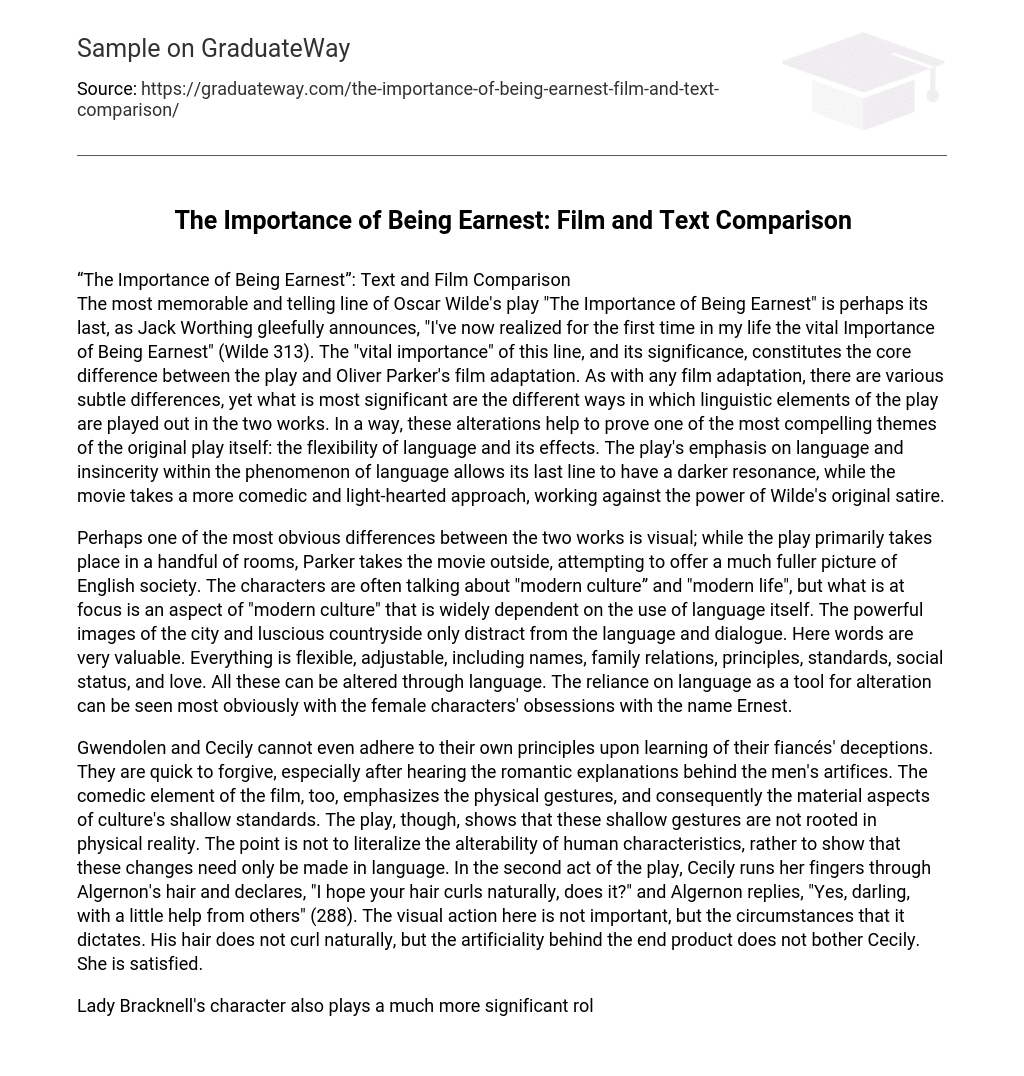“The Importance of Being Earnest”: Text and Film Comparison
The most memorable and telling line of Oscar Wilde’s play “The Importance of Being Earnest” is perhaps its last, as Jack Worthing gleefully announces, “I’ve now realized for the first time in my life the vital Importance of Being Earnest” (Wilde 313). The “vital importance” of this line, and its significance, constitutes the core difference between the play and Oliver Parker’s film adaptation. As with any film adaptation, there are various subtle differences, yet what is most significant are the different ways in which linguistic elements of the play are played out in the two works. In a way, these alterations help to prove one of the most compelling themes of the original play itself: the flexibility of language and its effects. The play’s emphasis on language and insincerity within the phenomenon of language allows its last line to have a darker resonance, while the movie takes a more comedic and light-hearted approach, working against the power of Wilde’s original satire.
Perhaps one of the most obvious differences between the two works is visual; while the play primarily takes place in a handful of rooms, Parker takes the movie outside, attempting to offer a much fuller picture of English society. The characters are often talking about “modern culture” and “modern life”, but what is at focus is an aspect of “modern culture” that is widely dependent on the use of language itself. The powerful images of the city and luscious countryside only distract from the language and dialogue. Here words are very valuable. Everything is flexible, adjustable, including names, family relations, principles, standards, social status, and love. All these can be altered through language. The reliance on language as a tool for alteration can be seen most obviously with the female characters’ obsessions with the name Ernest.
Gwendolen and Cecily cannot even adhere to their own principles upon learning of their fiancés’ deceptions. They are quick to forgive, especially after hearing the romantic explanations behind the men’s artifices. The comedic element of the film, too, emphasizes the physical gestures, and consequently the material aspects of culture’s shallow standards. The play, though, shows that these shallow gestures are not rooted in physical reality. The point is not to literalize the alterability of human characteristics, rather to show that these changes need only be made in language. In the second act of the play, Cecily runs her fingers through Algernon’s hair and declares, “I hope your hair curls naturally, does it?” and Algernon replies, “Yes, darling, with a little help from others” (288). The visual action here is not important, but the circumstances that it dictates. His hair does not curl naturally, but the artificiality behind the end product does not bother Cecily. She is satisfied.
Lady Bracknell’s character also plays a much more significant role in Wilde’s play. She is stern and intimidating in the play, but she is not dictatorial. In the text, she is offered as a strong female character, as a voice of authority, and as representing the practical mentality of Victorian society. She is not the antagonist, as the movie might make her out to be. The text recognizes her as absurd because she is right. She does not participate in games of deception like the two men and she is exactly who she comes out to be. The scene when she rigorously interrogates Jack Worthing is significant. She asks questions such as, “Was [your father] born in what the Radical papers calls the purple of commerce, or did he rise from the ranks of the aristocracy” (267)? Lady Bracknell has learned the worth of certain characteristics, and has learned how to obtain those characteristics if they are lacking. She says, “We live, I regret to say, in an age of surfaces” (304) and later to Cecily, “You are perfectly right in making some slight alteration” (306). She is intelligent and adaptive, and reminds us that she has acquired her present status through various alterations. The movie version of Lady Bracknell though is portrayed as the obstacle in the way of a happy ending, as the opposing force, and is even given a flashback scene that tacks on a compromising past that her character does not need.
This altered portrayal of Lady Bracknell and the decreased emphasis on language and dialogue leads the movie toward a different end. Though the movie ending plays out similarly to the play’s, the endings resonate differently. At the end, Lady Bracknell says, “My nephew, you seem to be displaying signs of triviality,” and Jack (now Ernest) replies, “On the contrary, Aunt Augusta, I’ve now realized for the first time in my life the vital Importance of Being Earnest” (313). This last line, and also the title, is more than just a witty pun. Language is malleable, yes, but so is the reality that revolves around the use of that language. The movie, focusing on relationships between characters, and asking viewers to sympathize with the lovers, echoes a serendipitous ending. Wilde’s ending is darker, satirizing relationships and Victorian ideals of love. Lady Bracknell is right, the ending is trivial, and Jack has not learned the importance of being earnest. What is revealed is the ease at which truths can be created. The language of the text emphasizes the ironical paradox that Jack has not learned the valuable trait of honesty, but rather validated the material worth of a name.





